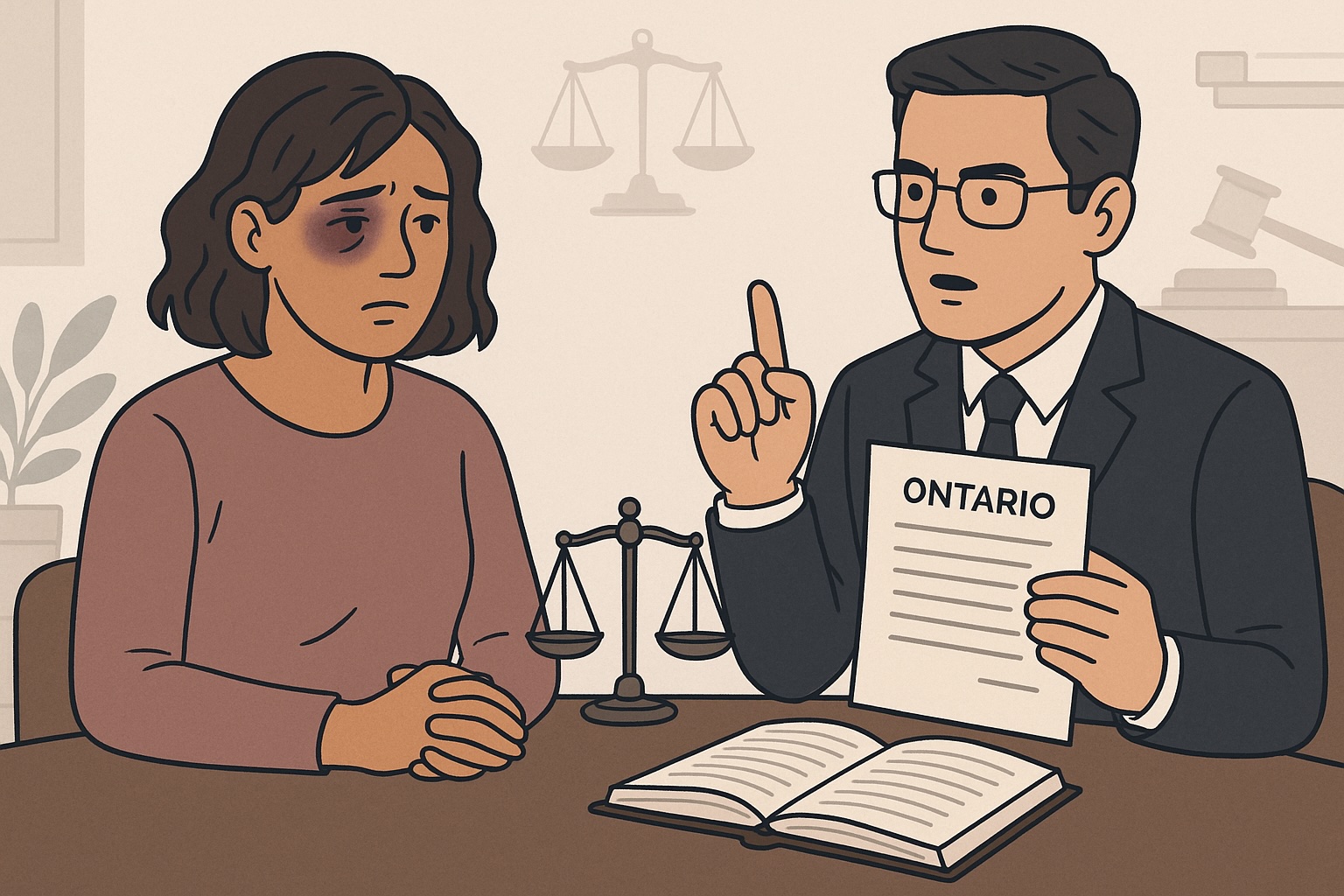Your Legal Rights as a Domestic Violence Survivor in Ontario
If you’ve experienced abuse, you have legal rights. This guide outlines protections available to domestic violence survivors in Ontario—including restraining orders, housing, child custody, and legal aid.

If you are a survivor of domestic violence, you have specific legal rights and entitlements under Ontario and Canadian law—even if you have not reported the abuse to police.
Here’s what you need to know about your legal protections, court options, and support services.
🔐 1. Right to Personal Safety
-
You have the right to be free from physical, emotional, and sexual abuse
-
You can apply for a restraining order (family court) or a peace bond (criminal court)
-
The court can order your abuser to stay away from you, your children, home, and workplace
-
Violating a restraining order or peace bond is a criminal offence
🧑⚖️ 2. Right to Access Legal Protection—Even Without Charges
-
You do not need to press criminal charges to file for family court protection
-
You can file a family court application for custody, access, child/spousal support, and a restraining order
-
Survivors can also apply for exclusive possession of the family home (even if jointly owned)
🏠 3. Right to Safe Housing
-
You can break a lease early under Ontario’s Ending a Tenancy for Safety Reasons law (Form N15)
-
Transitional housing and emergency shelters are protected spaces where abusers cannot enter
-
Some shelters offer legal clinics and court accompaniment
👩⚖️ 4. Right to Custody and Parenting Arrangements
-
The court must consider family violence when deciding parenting time and decision-making
-
You can request supervised access or no access for the abusive parent
-
Courts may limit or remove contact if it's not in the child’s best interest
💰 5. Right to Financial Support and Compensation
-
You may qualify for spousal or child support through family court
-
Emergency income may be available via Ontario Works (OW) or ODSP
-
You may be eligible for the Victim Quick Response Program+ (VQRP+), which offers:
-
Emergency relocation support
-
Safety devices or lock changes
-
Trauma therapy or counselling reimbursement
-
🧑⚕️ 6. Right to Confidentiality and Non-Judgment
-
Service providers (legal aid, shelters, doctors) must keep your situation confidential
-
You can access services anonymously if needed
-
You have the right to be believed, heard, and treated with dignity—regardless of your immigration status, gender, or language
📌 Summary: Your Legal Rights in Ontario
-
✅ You can apply for a restraining order or peace bond
-
✅ Family violence affects parenting and custody decisions
-
✅ You can break a lease early if unsafe
-
✅ Legal aid and financial programs may help cover legal costs
-
✅ You have a right to privacy, safety, and dignity—always
📞 Where to Get Help Understanding Your Rights
-
Assaulted Women’s Helpline (24/7): 1-866-863-0511
-
Legal Aid Ontario: 1-800-668-8258 – legalaid.on.ca
-
Luke’s Place: Legal support for women leaving abuse
-
211 Ontario: For housing, financial, or legal referrals
-
Barbra Schlifer Clinic: Legal advocacy, family court help, and trauma counselling
Frequently Asked Questions (FAQs)
1. What is the most important right I have in the workplace if I'm experiencing domestic violence?
In Ontario, you have the right to Domestic or Sexual Violence Leave. This is a job-protected leave that gives you up to 10 days and 15 weeks off to deal with the impacts of abuse, with the first five days being paid.
2. Can I force my abusive partner to leave our home?
Yes. You can go to family court and ask a judge for an order for exclusive possession of the matrimonial home. If granted, the abuser is legally required to leave the home, and only you are allowed to live there, at least temporarily.
3. Will the abuse affect who gets custody of our children?
Yes. The law in Ontario explicitly requires a judge to consider any instance of family violence when deciding what is in the best interests of a child. It is a major factor in determining who will have decision-making responsibility and what the parenting time schedule will be.
4. My landlord says I can't break my lease. Is this true?
No. If you are leaving for reasons of safety from domestic violence, Ontario law gives you a special right to end your tenancy. You must provide your landlord with 28 days' notice using Form N15 and a copy of
